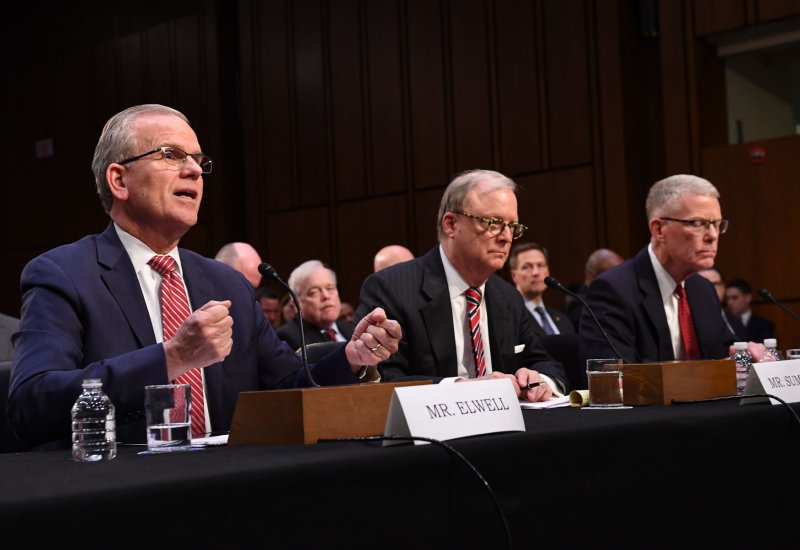1 of 4 | Daniel Elwell (L), acting administrator of the Federal Aviation Administration; Robert Sumwalt, chairman of the National Transportation Safety Board (C); and Calvin Scovel, inspector general of the Transportation Department, testify during a Senate Commerce, Science and Transportation Subcommittee hearing on the state of airline safety in the wake of the two Boeing 737 Max crashes. Photo by Kevin Dietsch/UPI |
License Photo
March 27 (UPI) -- The Federal Aviation Administration plans to increase its oversight of air safety by the summer, officials said during testimony before Congress on Wednesday.
Department of Transportation Inspector General Calvin Scovel announced the changes during testimony before the Senate Committee on Commerce, Science and Transportation's Subcommittee on Aviation and Space nearly three weeks after a Boeing 737 Max 8 crashed in Ethiopia and killed 157 people.
The same aircraft model crashed in Indonesia in October, killing 189 people.
"By July 2019, FAA plans to introduce a new process that represents a significant change in its oversight approach," Scovel said.
The updated oversight procedures will prevent airplane manufacturers from signing off on planes using the FAA's name.
Scovel said the changes were based on a 2015 report to his office stating that the FAA needed to improve its oversight of the aircraft certification process when portions are delegated to third parties like Boeing.
FAA chief Daniel Elwell testified that the agency granted Boeing an amended certificate for the 737 Max because it was similar to older models, adding that light safety board of pilots from Europe, Canada and the United States didn't recommend additional training for pilots flying the new model.
Sen. Richard Blumenthal, D-Conn., said the FAA's actions sacrificed safety in favor of cutting costs.
"The fact is the FAA decided to do safety on the cheap which is neither cheap nor safe and put the fox in charge of the hen house," Blumenthal said.
Elwell described the FAA's certification process involving third-party entities as extensive and well-established adding such third parties have " consistently produced safe aircraft designs for decades." He added that without the assistance of third parties the agency would require 10,000 more employees and $1.8 billion to certify aircraft
He also supported the oversight changes, adding that the investigation into the crash "absolutely" would change how the FAA certifies aircraft.
"As the aerospace system and its components become increasingly more complex, we know that our oversight approach needs to evolve to ensure that the FAA remains the global leader in achieving aviation safety," he said.
In a separate hearing before a Senate appropriations subcommittee, U.S. Transportation Secretary Elaine Chao testified that the practice of allowing plane manufacturers such as Boeing to help certify their new aircraft to meet safety standards is necessary and stressed that the certification process is "of course, subject to oversight and supervision by the FAA."
"Let me emphasize that safety is always No. 1 at the Department of Transportation, and a good day is when nothing bad happens," Chao said.
Sen. Ted Cruz, R-Texas, chairman of the Senate subcommittee, said lawmakers have a duty to find out what caused the crashes and scrutinize regulatory approvals.
"The early indications are that the causes of those accidents were similar," he told CNBC. "There have been multiple reports that Boeing itself was deeply involved and embedded in the certification process. We want to know how private companies are involved."
Tuesday night, an empty Boeing 737 Max 8 made an emergency landing after the pilots reported an engine problem after takeoff. The plane was being flown to California for storage until the FAA's grounding order is lifted.
No one from Boeing testified at the meeting, but the company briefed about 200 pilots at its Seattle-area facility on potential solutions for flying the Max 8.
During the briefing, Boeing's vice president of product strategy, Mike Sinnett, said an update on the anti-stall software that may have played a role in the two crashes was close to being completed.
Pilots from five airlines have tested the software update in a flight simulator. Among Boeing's proposed changes are backup angle-of-attack sensors, new alerts when the automated flight control system takes over and modified pilot training.
A "service-ready" version of the software fix is expected this week. It addresses flaws in the Max 8 flight-control system that are believed to have factored in both crashes.
Boeing said it's conducting lab and flight simulator tests and using pilots to evaluate the software patch under different scenarios, including varying airspeed and angle of attack, a company official said in a statement.
"Boeing continues to support the ongoing accident investigations, and is working with the authorities to evaluate new information as it becomes available," the company said. "Safety is our top priority when we design, build, deliver and maintain Boeing aircraft."
Sinnett said he had confidence that the 737 Max is a safe airplane and would operate safely after the software update.
"The rigor and thoroughness of the design and testing that went into the Max gives us complete confidence that the changes we're making will address any of these accidents," he said.
Boeing also said it would stop charging customers to add a feature in Boeing 737 Max cockpit displays showing the plane's angle of attack and another that shows when the sensors disagree.
"Not all customers wish to include this feature on their primary flight display, so it is offered as a customer-selected option," the company said.
During Wednesday's hearing, Sen. Edward J. Markey, D-Mass., asked Elwell whether all available safety features should be required on planes, to which he responded that all "safety-critical pieces of equipment on an aircraft are mandatory."
"I find it hard to believe that a safety company like an airline would save a couple thousand dollars on an option that might improve safety," he said.















